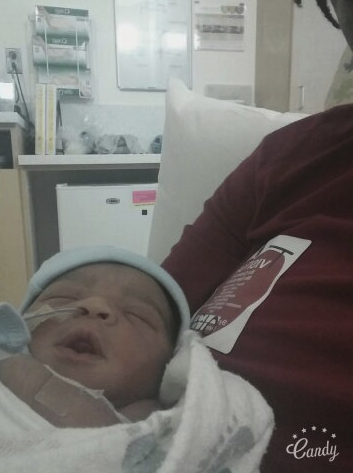
I read the right books. I attended La Leche League meetings. I asked all the “right” questions — with a birth plan in hand. But sadly, none of that could prepare me for the cascade of interventions I faced when I gave birth to my son last year. And it certainly didn’t prepare me for the resentment I felt as I mourned the loss of my “ideal” birth.
Not alone
Nearly a quarter of new mothers have one or more symptoms of postpartum PTSD, Sharon Dekel, an instructor at Harvard Medical School, tells The Atlantic. Other researchers estimate PTSD may affect up to 17 percent of new moms, adds The Atlantic. Looking at those figures, I can’t help but feel like a statistic.
On Jan. 13, 2016, I went to my scheduled prenatal appointment at my usual OBGYN; I was 36 number of weeks pregnant. The actual appointment went like any other. I asked question about dilation, my weight, the health of the baby. I was satisfied with the responses and went to schedule my next appointment. That’s when I saw two things — one expected, one not.
The expected: My next appointment was in two weeks. The unexpected: I'd be getting an ultrasound. This was my first child and so I didn't realize that there wasn't anything abnormal about an ultrasound at 34-plus weeks. But than I saw a note on my paperwork that read “follow up on kidneys.” I felt uneasy.
My drive back to work was a blur. I spent a significant part of it calling those I knew, and asking if they had had ultrasounds this late in their pregnancies. When I arrived at work, a combination of their responses and my guilt for not being a proactive mother influenced me to pick up the phone.
I called the hospital and spoke with a nurse. Could she help me decode the medical jargon? She looked up my file and informed me that at around 22 weeks, my medical team had noticed an abnormality in my baby's kidneys. My son had a condition referred to as hydronephrosis; there was an excess of fluid and his kidneys were extremely swollen.
They'd had notes of this condition since November; it was now halfway through January. “If I hadn't have asked questions, I still wouldn't have known!" I told the nurse, shocked. She agreed that it was strange I hadn't been informed; she'd have a doctor call me within the hour.
Several hours and redials later, I spoke with the doctor on-call, who told me I hadn't been informed because my medical team expected the condition to resolve itself. The scheduled ultrasound was an to check on the progression of the condition. She apologized for the lack of communication and said she'd squeeze me in for an ultrasound the next day.
At this point, I was inconsolable. I tried my hardest to work but spent most of the day Googling 'hydronephrosis.'
At this point, I was inconsolable. I tried my hardest to work but spent most of the day Googling 'hydronephrosis.'
The next day, my husband and I went to the hospital hoping the ultrasound would quiet our fears. Instead, we were told our baby's kidneys had gotten worse.
After a few angry words with the doctor, she informed us that if it were up to her I should be induced that day to mitigate concerns about my son’s condition. She rang the nearest specialist for a second opinion and we learned that I didn’t need to be induced that day. Instead, we should drive two hours to another hospital. Our local one wasn't prepared to handle our baby's condition.
Once there, the specialist confirmed the severity of our son’s condition, explained that I would eventually require an induction and recommended that we stay near the hospital. That’s how I spent two weeks at the hotel across the street with my mother, brother and husband.
Labor begins
On Friday, Jan. 29, on the eve of my labor, I shared my birth plan with my new doctor. I wanted my water to break on its own, followed by labor in a tub with intermittent monitoring, if possible. I wanted the ability to move as freely as possible and didn’t want an epidural.
We needed a new plan, said the doctor. Because I was being induced, I wouldn’t be able to follow my desired pain management strategies. I was angry and felt defeated. How could I have my birth without following my plan?
Not that I had long to consider the what ifs; I went into labor that night. It was quick and painful; I lost a lot of blood and got an episiotomy that I was told shouldn’t bother me because, as my doctor explained, “I had one with each of my children.” I felt disgusting for having met most of my birth goals, and felt worse as I watched my baby sent off to the NICU. Of all else, I thought he would be allowed to room in.
In addition to kidney issues, my son struggled to keep food down for the first five days; he lost weight. We are unsure if the issues were related but that first week was a challenge from all directions. He was hooked up to anywhere from two to five wires at a time. It broke my heart to see my son in these conditions. But he was and continued to be a fighter.
Amazingly, the same day my milk came in was the day he started keeping his food down. We don’t know what caused this change, but we were so grateful it did. Once he was able to keep 10 milliliters of milk down and had passed the most basic of kidney exams, we got the amazing news that he could come home. A week and a half after coming home, we were getting into our new normal.
And then the pain started.
Not done yet

Several times a day, I was finding it difficult to walk the three feet from the bed to the changing table. I had no idea what was normal after a delivery, so I thought nothing of it until we went out to eat on Valentine's Day.
As we gathered our belongings after the meal and headed for the car, a pain hit — so sharp that I quickly handed the baby to my husband and ran to the nearest restroom.
I felt a strange sensation, an unexpected pushing similar to what I'd felt during labor. I hardly had time to lock the stall before I felt something fall out of me on to the floor. It was a golf ball-sized blood clot. Was this, I wondered, what had caused so much pain? I did my best to clean up the mess before finding my husband and telling him we had to go to the emergency room. Now.
Hours later, I had an ultrasound and vaginal exam. “It’s normal for new mothers to experience clotting and discomfort,” said the emergency room doctor.
Despite the continuing pain, my son and I flew to Texas so my family could meet the baby without my husband. It didn't take long before I had trouble breathing after walking short distances. The abdominal pains increased and the clots returned. I felt helpless.
One day, I felt well enough to bathe. Not long after settling into the tub, clots the size of my palm began to leave my body. It looked as though I was bathing in red paint. I called a nearby doctor's office and described my symptoms. They instructed that we drive to the nearest emergency room immediately.
The wait in the ER felt like it took forever. My color began to fade; I was losing too much blood. One nurse saw the pain in my eyes. I remember her saying she would not rest until she got me into a hospital room. "We have to stick together," she said. And soon, I was in a room. I thank God for her; she was my guardian angel.
The pain was unbearable, but they began the tests immediately.
"How long ago did you have your baby?" asked the doctor. “You’re still showing a positive pregnancy test." I looked at my mom and aunts, confused as I was rushed off to an ultrasound.
My abdomen was so tender that it took all I had not to cry during the entire exam.
"I have no idea what kinda training the last ultrasound tech had, but they should be fired. Your uterus has left over placenta," the emergency room ultrasound tech informed me. I was lucky I hadn't gotten an infection and died, the tech added.
The rest was a blur; I was told I would be having an emergency D&C. I was placed under general anesthesia and woke up hours later. The first few days of recovery were really hard. I fell a lot. It was like learning to walk again.
Moving forward
In the months since, many have advised that I press charges but I'm just happy to be feeling better. It took me a while to realize I was traumatized. The first hospital did not see me as worthy to be informed of my son's condition. The labor and delivery doctor did not see my opinion as valuable when she made the decision to give me an episiotomy without consent. I was not special enough to be checked thoroughly to make sure all post-birth materials had been removed. And lastly, I was not informed enough to be trusted when I knew something was wrong with my body.
Had the first hospital not told me so late, I doubt there would have been such a sense of urgency. Less urgency would have resulted in more freedom and care during my labor. More care might have prevented postpartum surgery.
I don’t want anyone to have a birth experience like mine, when it can be avoided. So mothers-to-be, be proactive in your pregnancy. Do not back down from your responsible birth request. Demand that birth professionals follow protocol to ensure all measures taken were correct. Next time, I will be more proactive in my health care. If I don’t know, I will ask.
I did everything in my power to prepare for birth, and it wasn’t enough. I plan to have another child one day, partially in an attempt to remedy my traumatic first birth. I was robbed. And I plan to take it back.











